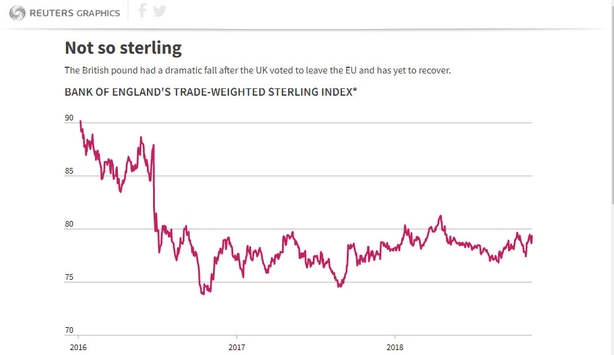Sterling tumbled today after a series of resignations rocked British Prime Minister Theresa May's government and threw into doubt her long-awaited Brexit agreement just hours after it was unveiled.
By 6pm the pound was down nearly 2% against the dollar at $1.271.
It is also headed for its biggest drop this year against the euro after Brexit minister Dominic Raab and four other ministers resigned in protest against her plan.
The euro had gained 1.8% to reach 88.6 pence.
Traders fear Theresa May's leadership is now in serious jeopardy.
Mrs May said yesterday she had won over her divided cabinet after a five-hour meeting but the resignations fuelled a selloff, reflecting rising fear in the markets about a "no-deal" Brexit.
Read more
May faces letters of no confidence as ministers resign
Brexit withdrawal agreement updates
No-deal contingency plans will continue - Coveney
Brexit accord leaves British financial services industry out in the cold
Wary business welcome for draft Brexit deal but more work to be done
Markets had priced in some opposition to the draft deal negotiated by May but the latest round of resignations unleashed a fresh wave of volatility in UK assets.
That sent investors to the relative safety of government debt.
British financial regulators called major banks asking for feedback on market conditions because of sharp falls in the pound, sources said.

The prime minister showed little sign of backing down but senior Eurosceptic lawmaker Jacob Rees-Mogg said a number of letters of no confidence in May had been submitted to party officials.
Concerns about a leadership challenge were reflected in the foreign exchange derivatives markets, where three and six-month gauges of expected volatility in the British currency spiked to their highest levels in two years.
Extreme short-dated volatility indicators also jumped.
The brewing uncertainty about Britain's economic future was also shown in the money markets, where investors have all but priced out a rate hike by the Bank of England next year.

